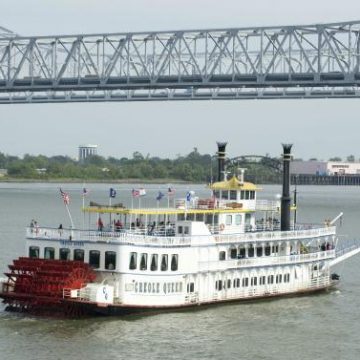
In business since 1991, Louisiana’s casino industry has been one of the most popular reasons to go to the Bayou State. Lately, however, revenues have begun to stagnate, forcing legislators in the state to look into the state’s gaming laws. There are several areas they are looking to change, and one segment is to bring online casino gaming and poker into reality.
Since they were conceived in 1991, the riverboat casinos were supposed to traverse the waters of the Mississippi, giving tourists the feeling of being a part of the origins of the state. Operators of those riverboats, however, found that people quit playing the various games onboard soon after they pulled out of the dock. Thus, they would find ways to cancel their trips while still having the passengers play. Only three of the 15 riverboats allowed in Louisiana are fully functional, especially after the state legislature dropped the sailing requirement.
Now the riverboats want to take it a step further. Legislation in the Louisiana State Legislature will be introduced that would allow for the riverboats to moor themselves further on land, up to 1200 feet inland, essentially eliminating altogether the laws regarding having to sail. Other bills that are being presented in the halls of Baton Rouge include expansion of the four horse racing tracks in the state – the “racinos” – to allow table games and video poker; Harrah’s New Orleans is looking to firm its monopoly on gaming in the area and the right to expand to a second hotel and a food serving outlet; and fantasy sports regulation.
The idea regarding the riverboats move to land isn’t out of the question. In the state of Mississippi, the same law existed that required the casinos in the state to be water-based rather than land-based. That changed after 2005, when Hurricane Katrina ravaged the area and basically destroyed those casinos that were on the edges of the Mississippi. As gaming was an important part of the Mississippi economy, the laws were changed that allowed the casinos to move onto land instead of remaining on the river.
Of particular interest in the flurry of legislation that is coming out are two bills in the Senate. One bill is Senate Bill 322, introduced by Republican State Senator Danny Martiny. The bill, if passed through the legislature, would open the state for full online casino gaming and poker – with a caveat. The second bill, also introduced by Martiny, would decide if the state would offer sports betting, should the U. S. Supreme Court overturn the Professional and Amateur Sports Protection Act (PASPA) of 1992 – with the same caveat facing SB322. Both bills being passed by the legislature would only put forth to the state’s 64 parishes a referendum for citizens to decide if they should become law.
Many of the bills put forward by Martiny regarding changing the regulations on gaming in the state of Louisiana are currently in the Senate Judiciary Committee awaiting action.
Louisiana Governor John Bel Edwards has shown signs to his fellow officials that he is more open to pro-gambling measures, much more than his predecessor Bobby Jindal. And it is entirely possible that it is because gambling has become the fourth largest revenue stream in the state – even larger than the oil and gas industries, the former “big dog” – and employs more than 25,000 across the state. It also must keep up with what is becoming an increasingly difficult market, as several states around Louisiana offer casino gaming that may cut into Louisiana’s profits.
Louisiana joins a host of states that, with state budgets getting tighter and budget shortfalls occurring, are examining the expansion of gaming in a physical sense or opening online gaming industries inside their states. Since Pennsylvania became the fourth state to pass online gaming and poker regulations that are expected to open for business later this year, legislatures in New York, Connecticut, West Virginia, Illinois and Michigan have examined opening for online gaming. It is expected that at least one state will join the “Big Four” – Delaware, New Jersey, Nevada and Pennsylvania – and become the fifth state to pass online gaming legislation of some type (either full casino gaming and poker or just poker) before the end of 2018.
No matter how much work Martiny and the legislature put into passing the bills, they still would have to go to the people of Louisiana in the form of a referendum. It could take as much as two years before that vote even takes place, meaning that it isn’t going to be anytime soon that Louisianans will be playing online poker. But the bills gaining traction in the Louisiana statehouse is a positive sign.















